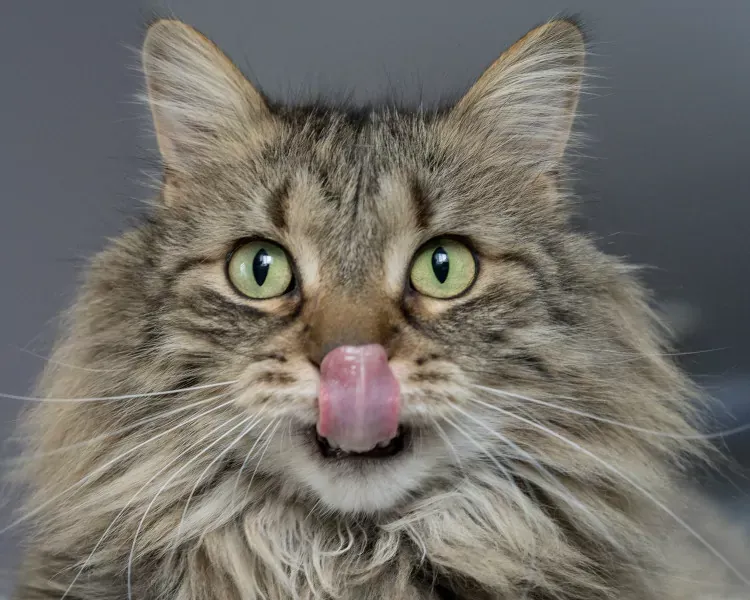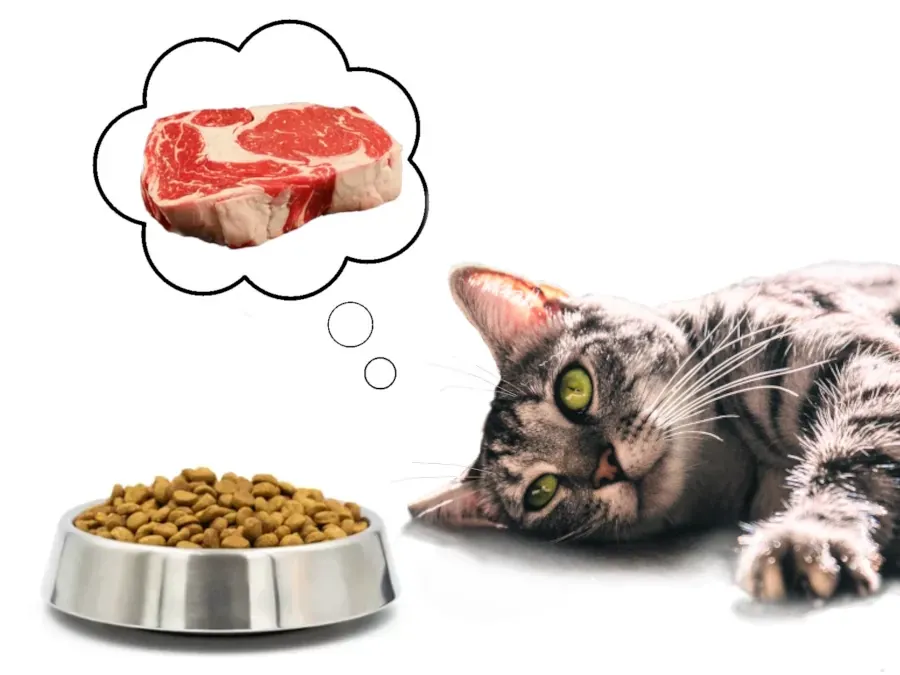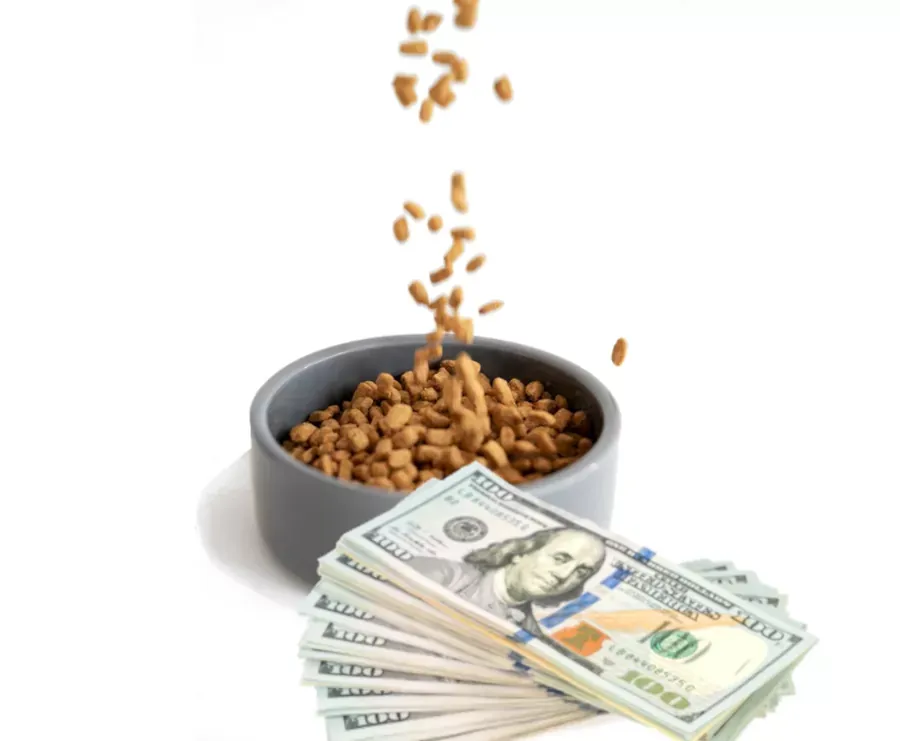What Would Cats Choose to Eat?
Most of us feed our cats ultra processed, man-made diets that are very far removed from their instinctual diet. Have you ever wondered what house cats would choose to eat if they could? A research study into food selection revealed that cats consistently chose nutrition over enjoyment.

Evolutionary events adapted the cat’s physiology and metabolism to live solely on prey animal tissues 1. Their strict carnivore diet also led to very unique digestive and metabolic characteristics.
Today, the house cat still resembles its wild ancestors very closely 2, 3. For carnivores, food selection is crucial for survival, driven by distinctive nutrient requirements and to avoid unbalanced and toxic foods 1.
One can also add that food selection is paramount for health. A diseased carnivore can not hunt and will therefore not survive.
...house cats are de-programmed carnivores
We meticulously programme our cats to eat foods that go entirely against their carnivore roots.
The ultra processed, man-made foods we teach them to eat are rich in ingredients that really have no place in a carnivore's diet – carbohydrates, sugar, plant oils, salt and a concoction of synthetics and chemicals.
In the absence of carnivore appropriate foods, cats learn to eat these inappropriate foods.

Be as it may, a research study shed some interesting light on what cats chose to eat when they were given the option.
Food selection research results
Researcher, Dr Hewson-Hughes, conducted a food selection study in house cats 4. For the experiments, the meals that cats could choose from offered different ratios of protein and fat to carbohydrates.
Initially, cats selected food based purely on flavour and they chose the most palatable meals. But these meals were also highest in carbohydrates – a macronutrient that is very problematic to a carnivore 3.
Notably, high carbohydrate foods are what we feed cats on commercial diets.
...an equally revealing (older) study
The same lead researcher conducted a similar study a few years earlier in which they noticed that cats consistently selected foods highest in moisture 5.
The cats showed a significantly stronger preference for wet food – in around 85% of cases – compared to dry. Sadly, dry food is the food fed to most cats around the globe.
Before continuing to look at the study results, let's consider why their foods are so high in carbohydrates and so different to what cats are supposed to eat.
...cat food manufacturers place their profits ahead of health
Despite high carbohydrate foods being detrimental to a cat's health, copious amounts are used in commercial cat foods because they are cheap and important for food processing 3.
Plant-based proteins and fats are also very popular cat food ingredients because they are so much cheaper than animal protein and fats. However, plant ingredients are far less useful, and even harmful to a carnivore's physiology 6.
Regardless of how bad dry foods are for cats, these foods are manufactured by the tonne and distributed across the globe, while the trade profits handsomely.

...given the option, cats choose carnivore appropriate foods
Back to the food selection study. Once the cats in the study got to the bottom of the food combinations and feeding pattern, a more long-term nutrition strategy emerged.
They consistently chose the meals that were highest in animal protein and animal fats and lowest in carbohydrates. These macronutrient ratios are, of course, much more suited to a hyper carnivore's physiology.
Even after the high protein, high fat meals were made unpalatable, the cats continued to consistently choose them. And in the older study, cats chose high moisture foods in 85% of the food consumed.
...study observations in a nutshell
While aroma initially dominated the choices made by the cats, macronutrient regulation soon took over 4. The study clearly demonstrated that, given the opportunity, cats place nutritional outcomes ahead of taste rewards.
The cats tolerated the unpleasant flavouring to get to the most carnivore appropriate, nutritious foods. They steered clear of the highly palatable – but less nutritious – high carbohydrate meals.
And the cats in the earlier study consistently selected food with a moisture content similar to their instinctual prey in the overwhelming majority of cases 5.
These results are both surprising.... and not. They clearly reflect the cat's biological programming as a hyper carnivore. And it confirms that there really is no place in the cat's diet for the carbohydrate rich foods we feed them.
It also underscores the high premium cats instinctively place on moisture rich food.
...the reality
Unfortunately, carbohydrate rich foods are fed to cats – day in and day out, across the globe – and they have no choice other than to eat them, or go hungry.
Also, dry foods with the least moisture dominate cat food sales across the globe. Unlucky for cats, it is also the food that is most add odds with their biology and urological health.
Keep reading as upcoming articles start to explore alternatives to commercial foods. One such article looks closely at the cat's unusually high protein requirement. Another looks at what cats should really be eating and why.
The next post looks at the importance of the right diet to felines. There promises to be many more such articles, and they are sure to be insightful!


References
1 Bradshaw, J.W.S., Goodwin, D., Legrand-Defrétin, V. & Nott, H.M.R. (1996). Food selection by the domestic cat, an obligate carnivore. Comparative Biochemistry and Physiology Part A: Physiology 114(3), 205 – 209.
2 Driscoll, C.A., Menotti-Raymond, M., Roca, A.L., Hupe, K., Johnson, W.E., Geffen, E., Harley, E.H., Delibes, M., Pontier, D., Kitchener, A.C., Yamaguchi, N., O’Brien, S.J. & Macdonald, D.W., (2007). The Near Eastern origin of cat domestication, Science, 317, 519– 523.
3 Verbrugghe, A. & Hesta, M. (2017). Cats and Carbohydrates: The Carnivore Fantasy? Veterinary Sciences, 4(4), 55; https://doi.org/10.3390/vetsci4040055
4 Hewson-Hughes, A.K., V.L., Colyer, A., Simpson, S.J. & Raubenheimer, D. (2016). Balancing macronutrient intake in a mammalian carnivore: disentangling the influences of flavour and nutrition. Royal Society Open Science, 3, 1 – 12; https://doi.org/10.1098/rsos.160081
5 Hewson-Hughes, A.K., Hewson-Hughes, V.L., Colyer, A., Miller, A.T., Hall, S.R., Raubenheimer, D. & Simpson, S.J. (2012). Consistent proportional macronutrient intake selected by adult domestic cats (Felis catus) despite variations in macronutrient and moisture content of foods offered. Journal of Comparative Phsyiology B, 183, 525 – 536; https://doi.org/10.1007/s00360-012-0727-y
6 Pierson, L.A. (2016). Feeding your cat: Know the basics of feline nutrition. In Cat Info. Retrieved February 3, 2023, from http://catinfo.org/
Disclaimer
The information provided on the Bestfedcats.com website is educational and informational. We are here to give guidance on how to feed a properly balanced raw diet. We also offer advice on how to improve the diet of the modern house cat. Please note that we are not veterinarians. We are not here to give veterinary advice. Best Fed Cats will not be held responsible for any adverse reactions to your cat based on the information on our website. The health of your cat depends entirely on you. We expect you to use your knowledge of your cats, their circumstances and their health – in conjunction with a trusted veterinarian – to determine if any advice provided on this site is appropriate for your cats.

